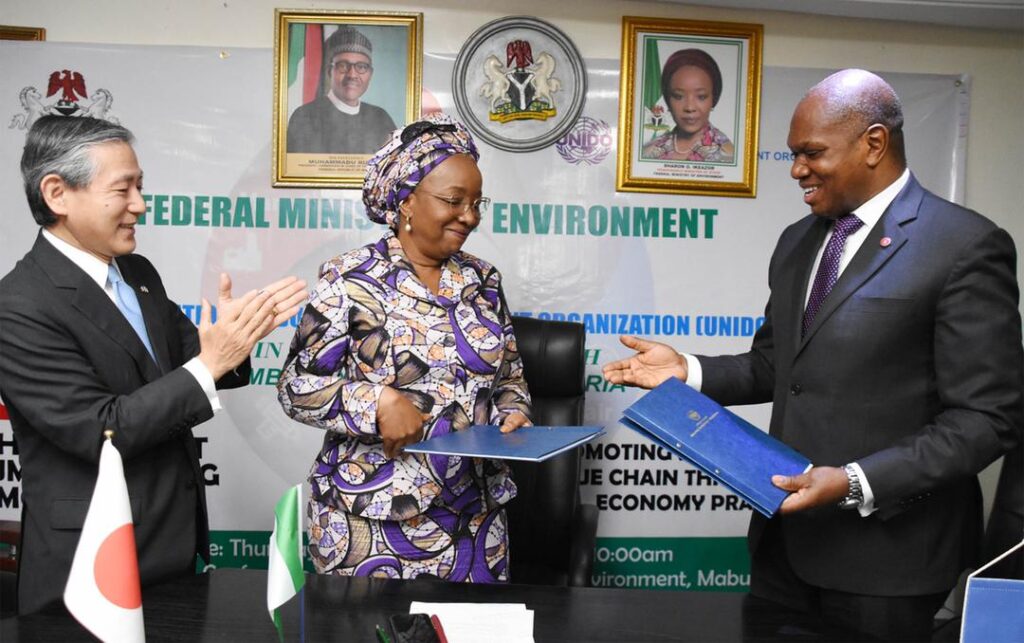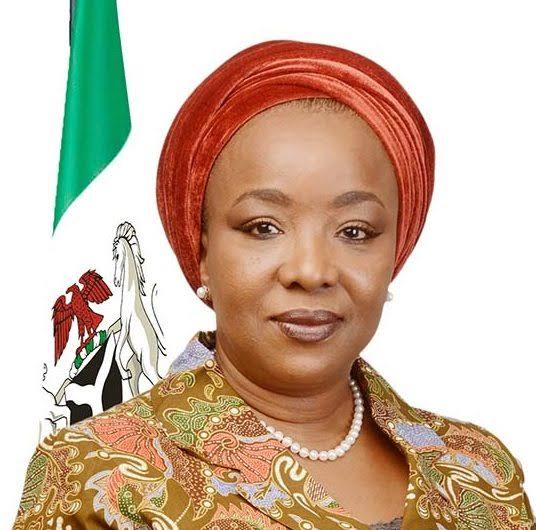Mukaila Ola
Minister of State for Environment, Chief Sharon Ikeazor has lamented that the nation generates about 32 million tonnes of solid waste yearly, with plastic waste contributing 1.15 million to the tally.
Ikeazor while delivering
a keynote address at the Signing Ceremony of the project “Promoting Sustainable Plastic Value Chain through Circular Economy Practices’’, in Abuja,
said Nigeria, with a population of over 200 million people generates about 32 million tonnes of solid waste per year, of which 1.15 million tonnes are plastic wastes, with little or no segregation is illegally dumped in open spaces including drainages or co disposed off with hazardous wastes such as health care wastes in dumpsites and burnt openly with an estimated 340 thousand tonnes ending up as marine litter.
The Minister said the signing of the project was necessary as the global community including Nigeria was making concerted efforts including developing a separate international instrument to address plastic pollution holistically and sustainably.
Ikeazor decried that: “These unwholesome practices have been linked to the perennial flooding across the country, increased respiratory and cardiovascular diseases, increased incidences of cancer, loss of aquatic life, loss in agricultural productivity,
“The large volume of plastic waste being generated in the country presents circular economic business opportunities across the plastic value chain which should be properly harnessed for job/wealth creation, establishment of micro, small and medium scale enterprises, private sector investment including foreign direct investment in addition to preventing/reducing plastic leakages to the environment. Therefore, the Ministry has taken proactive measures to promote, institutionalise and entrench sound circular economy principles and practices in the country.”

She revealed that these actions include:
Putting in place National policies on Solid Waste and Plastic waste management,
Inclusion of waste sector in the Revised Nationally Determined Contribution (NDC),
membership of African Circular Economy Alliance, Nigeria is a founding member and co-chair of the African Circular Economy Alliance.
Also the establishment and implementation of the Extended Producer Responsibility (EPR) Programme; nembership of the Global Plastic Action Partnership (GPAP). Nigeria is in the process of domesticating the GPAP into the Nigeria National Plastic Action Partnership (NPAP); establishment of the Nigeria Circular Economy Working Group and the Nigeria Circular Economy Programme; several initiatives such as the World Bank Assisted ProBlue Project for Lagos, National Plastic Waste Recycling Programme, Waste to Wealth Entrepreneurship Programme, Community based Solid Waste Management Programme.
The minister said Nigeria’s circular economy potentials can be seen in its large and thriving waste management sector that attracts operators due to the high volume of wastes and demand for recycled materials.
She noted that one of the ways to realize the potential was to support the industry by demonstrating benefits of adopting circular economy practices with innovative technologies including recycling technology or alternative material production.
The minister said: “This is exactly what this project whose objective is to promote the integration of circular economy principles and practices into plastic waste management, strengthen plastic value chains, demonstrate the benefits of adopting circular economy practices and resource efficient production of plastic value chains in Nigeria, is designed to achieve.
“This project would therefore complement the efforts of our government in mainstreaming circular economy principles and practices into our National Development Plans”.
She recalled that the Government of Japan funded a study on available sustainable alternative materials for plastic innovative packaging and recycling technologies that meet market needs in Africa to reduce plastic leakages to the environment, in Nigeria.
She said the study which was conducted in year 2021 was implemented by UNIDO in collaboration with the Ministry, adding that it was against the background that the ministry once again welcomed the project which was being supported by the Government of Japan and to be implemented by UNIDO in collaboration with the Ministry and other key partners.
The minister thanked UNIDO and the Government of Japan for their tireless efforts in supporting the country to address its numerous environmental challenges particularly plastic pollution.
The minister also commended the presence of other key partners, and enjoined them to work as a team to ensure effective implementation of the project.

